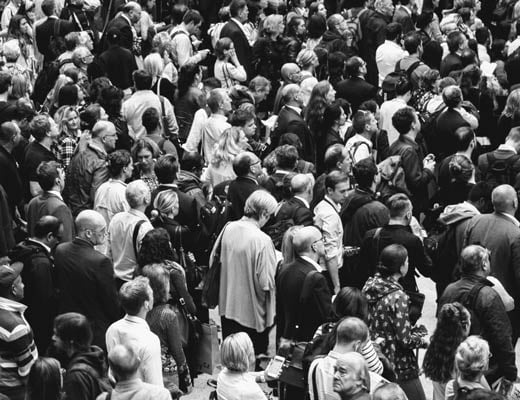No products in the cart.
What are the Top 10 Triggers for Anxiety?
According to the Depression and Anxiety Association of America, around 18.1% of the population suffers from an anxiety disorder, making it one of the most common forms of mental illness in the United States. Domestically, around 40 million people currently struggle with these conditions, but only 36.9% end up being treated. So, what are the top 10 triggers for anxiety?
Table of Contents
hide
10. Caffeine
Caffeine works by stimulating your nervous system, but too much of it can actually cause you to feel anxious. Higher amounts of caffeine can also lead to shaky hands and a racing heart.
If you are experiencing more anxiety than usual, it may be a good idea to cut down on caffeine.


9. Alcohol
Many people who suffer from an anxiety disorder may attempt to cope with it by drinking alcohol. On the surface, this may seem to temporarily alleviate the problem, but over time it actually leads to increased anxiety. There is a large prevalence of comorbidity with alcohol dependence and anxiety disorders.
Alcohol also causes long term physical damage to the body. Around 15 million people in the United States have an alcohol dependency, which can lead to depression, cancer, heart disease, and eventually death. It is not a viable coping mechanism and there are much more effective ways of treating anxiety.
8. Family
While we love our dearest friends and family, they can also be a big trigger for anxiety. Familial obligations, important events like weddings and holiday get togethers can all be a huge source of stress and or having to travel on a plane for these events can be stressful even if they are meant to be fun and enjoyable. Because family is so close, they typically have a larger impact on our day to day life. They may also know what emotional buttons to push during disagreements, which can make conflicts between family members particularly stressful. Unfortunately, domestic violence and abuse can also lead to long term trauma from stress.


7. Crowds
Some people suffer from social anxiety when exposed to large amounts of people. Several related conditions, including enochlophobia and ochlophobia, involve a fear of large crowds or mobs. Agoraphobia, which is a fear of unknown people and places, is also closely linked to this trigger.
6. Global Problems
Most people are aware of the currently high levels of unrest in the world today, and a noticeable increase of general anxiety has been seen in the majority of the population. Regular, everyday problems are stressful enough without having to worry about everything on a global scale, and it can become quite overwhelming.


5. Health Problems
Health problems are something that always seems to truly put things into perspective. Poor health can severely affect every aspect of life, and chronic conditions may often result in depression. Side effects of prescription drugs can also take a large toll on your body over time.
When a loved one is sick or suffering, it increases feelings of helplessness at not being able to do more. Sometimes it is harder to see others in distress, and this can lead to particularly acute feelings of anxiety.
4. Money Problems
Money problems can often feel insurmountable and overwhelming. When providing for a family, the pressure of not knowing whether a paycheck will stretch to cover rent, or having to choose between medicine and food can cause an immense amount of stress and anxiety.
These feelings of insecurity are even more heightened during times of global recession and economic instability.


3. School Problems
Students at school are often put under immense pressure to compete for the highest grades and scholarships. The stress of homework, constant study and difficult exams combined with trying to navigate social relationships and extra curricular obligations can often be difficult to juggle
2. Work Problems
The work environment can be filled with all sorts of its own stressors, and these can vary greatly between different occupations. Many adults spend most of their day at work, and often develop complex relationships with coworkers and customers that revolve around their mutual dependence on each other.
Interpersonal conflicts between coworkers can be particularly challenging when a livelihood is at stake, and the stress from a miserable work environment can leak into other aspects of daily life.


1. Death of a Loved One
There is nothing more devastating than the death of a loved one. The pain and anguish of loss can cause such incredibly intense stress and anxiety that it can be extremely difficult to cope with.
Grieving is a natural process of death because the body needs a way to overcome the overwhelming feelings of sadness. Death causes trauma that can take years to truly come to terms with.
What Causes Anxiety?
In order to learn what causes anxiety, it is important to understand how it affects our body and how severe of an impact it can have on our life. There are five major types of anxiety disorders: Generalized Anxiety DIsorder (GAD), Obsessive-Compulsive Disorder (OCD), Panic Disorder, Post-Traumatic Stress Disorder (PTSD), and Social Phobia (Social Anxiety Disorder).
A variety of factors can come into play when it comes to the development of these conditions. Fortunately, most are relatively easy to treat; however, why do only 36.9% of those who are suffering seek treatment? There is still a significant stigma surrounding mental illness in the United States, and this often prevents people from getting the help they truly need.
What Does Anxiety Mean?
What does anxiety mean to you? The American Psychological Association defines anxiety as “an emotion characterized by feelings of tension, worried thoughts and physical changes like increased blood pressure.”
Anxiety is how our body reacts to stress, which can be caused by physical or emotional hardships. When we are confronted by a situation that we feel we do not have the resources to overcome, our body triggers its automatic defenses with a process known as the Fight or Flight Response
It begins with the activation of the hypothalamus, which is a small region of the brain that is responsible for regulating our hormones. When the hypothalamus is activated, it signals the release of adrenaline and cortisol. These hormones are meant to keep us alert, and will cause an increase in heart rate. This can also lead to nausea, sweating, and dizziness.
Over time, prolonged stress can deplete the body’s resources, as the Fight or Flight Response will continue indefinitely. This may result in a severely decreased immune system and leave the body with less natural defenses. That is why it is important to identify and treat the causes of anxiety as soon as they are experienced.
What are the Symptoms of Anxiety?
While it is inevitable that everyone will experience occasional anxiety during their life, for some that feeling will remain prevalent regardless if there is a discernible cause. The symptoms of anxiety can have many significant impacts on daily life, including trouble sleeping, getting easily fatigued, pain in muscles from too much tension, irritability, racing heart, sweating, trembling, shortness of breath, nausea, loss of appetite, and excessive worry.
It can be hard for some people to understand why others have difficulty managing their feelings. People who suffer from “invisible illnesses” like anxiety or depression often endure more scrutiny because the cause of their symptoms is not visually apparent, and this in itself can exacerbate the effects of these conditions.
Treating Anxiety
Treating anxiety can be much easier than most people think. There are a lot of tools that can be used, and it is always best to check in with a doctor or therapist and let them know what kind of symptoms and stressors you have been experiencing. Knowing the legal status within your state for cbd oil is also helpful if you’re looking for natural solutions. Many professionals will recommend Cognitive Behavioral Therapy (CBT), or medication to help alleviate their patient’s condition.
Some natural remedies are also very popular forms of treatment, such as exercising and breathing or meditation techniques. Many people use certain herbs and supplements that are designed to boost the mood, or partake in relaxing experiences like aromatherapy, massages, and even acupuncture. Self-care is very important, in whatever form suits you best!

